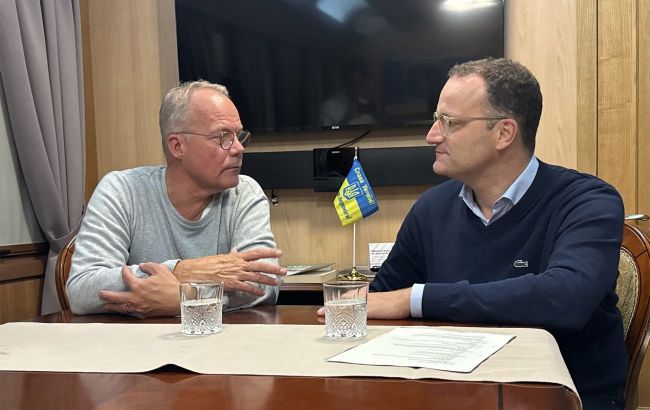German lawmakers open to discussion on frozen Russian assets for Ukraine
 Leaders of two Bundestag coalition factions – Jens Spahn and Matthias Miersch (photo: Getty Images)
Leaders of two Bundestag coalition factions – Jens Spahn and Matthias Miersch (photo: Getty Images)
German lawmakers declared openness to the issue of using frozen Russian assets to support Ukraine. The matter concerns €210 billion of Russia's Central Bank frozen in the European Union, Tagesschau reports.
With the corresponding statement, the leaders of two Bundestag coalition factions, who are on a visit to Kyiv – Jens Spahn from CDU/CSU and Matthias Miersch from the Social Democratic Party of Germany (SPD) – spoke out.
Miersch emphasized that negotiations are ongoing among European countries regarding new sanctions against Russia. According to him, at present "all options are on the table."
According to preliminary data from the European Commission, about €210 billion of assets of the Russian Central Bank are frozen in the EU. The main part of these funds is held at the Brussels financial institution Euroclear.
Since the middle of last year, the EU has begun using interest income from these assets to finance the supply of weapons and ammunition to Ukraine. At the same time, the direct use of Russian funds through a decision on expropriation raises doubts in a number of EU countries due to legal risks and possible retaliatory steps from Moscow.
Today, Jens Spahn and Matthias Miersch are on a visit to Kyiv. This became the first joint visit of the leaders of the parliamentary groups of CDU/CSU and SPD to Ukraine. For both politicians, this is also their first trip to Kyiv.
During their stay in the Ukrainian capital, they plan to discuss further German support for Ukraine, as well as diplomatic steps aimed at ending the war.
How frozen Russian assets are proposed to be used
Earlier, media reported that the European Commission is developing a mechanism that would allow the transfer of nearly €200 billion of frozen Russian assets for the reconstruction of Ukraine after the war.
Brussels is assessing the readiness of national governments to convert these funds into riskier investments that could bring Ukraine additional income and increase pressure on Russia.
Supporters of this approach see it as a step toward the possible confiscation of the assets and their transfer to Ukraine as punishment for Moscow's refusal to pay compensation after the war ends.
Meanwhile, French President Emmanuel Macron stated that the European Union cannot confiscate the frozen assets of Russia due to the lack of a legal basis.

